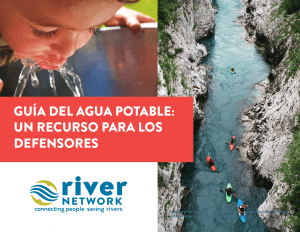Centering Equity: River Network’s Drinking Water Guide
Water Equity: What Does It Mean?
The US Water Alliance defines water equity as the point at which “all communities have access to safe, clean, affordable drinking water and wastewater services; are resilient in the face of floods, drought, and other climate risks; have a role in decision-making processes related to water management in their communities; and share in the economic, social, and environmental benefits of water systems.”
As much as the pillars of this definition seem obvious, the gaps in achieving a society that provides these outcomes remain wide. The barriers to achieving water equity are large, complex, and systemic, requiring an intersectional understanding of the structures that make up our water systems and their interactions with peoples’ lives. Looking at equity, whether you’re talking about affordability, climate resilience, decision-making power, or otherwise, we know the lines that divide the haves and have nots are most consistently race and income, which are often intertwined themselves.
Unfortunately, we as an organization can not single-handedly rework the systems that perpetuate these inequities. What we can do, however, is recognize the historic and current power and privilege held by us in the water and environmental movement and make an explicit commitment to centering equity in our work. At River Network, we have put equity at the center of our mission and committed to standards by which we hold ourselves accountable to this work as an organizational first step. We recognize that we still have a long way to go. We continue to learn from many leaders in the movement for Environmental Justice and equity and those who are directly impacted by water inequities. To lead is to listen in this space, and to provide support for those on the frontlines of this work with our organization’s robust capacity building and networking resources.
The Drinking Water Guide
In listening to our network of leaders, we knew equity would be fundamental to the development of our Drinking Water Guide. Recognizing that communities across the country – primarily low-income, communities of color – struggle to afford their water, or are faced with concerns over contamination from toxins, like lead and PFAS, or both, we developed our Drinking Water Guide through a lens of equity and with a specific section dedicated to discussing the impact of drinking water on equitable outcomes. Supported by the C.S. Mott Foundation, and guided by a Great Lakes-based Advisory Committee, the Drinking Water Guide also provides in-depth information, resources, and case studies organized into sections that answer these fundamental questions:
- Where does drinking water come from and how can we protect it?
- What does a drinking water system do?
- How do we ensure water is safe to drink?
- How is drinking water cost calculated? What do water bills pay for?
- How will climate change affect our water? What can we do about it?
- How can we support community advocacy and engagement on drinking water issues?
 In many ways, equity means access. That’s why just last month we launched a Spanish language edition of our Guide in collaboration with Corazón Latino, increasing its accessibility, reach, and relevance. This version of our Guide has been adapted for the Latinx community with both culturally relevant language and aesthetic – with adapted images and examples to resonate with the community and equip them with the tools needed to work toward change at the local level. This is just one step in our continuing work to operationalize the Drinking Water Guide. We are listening and learning from our network of water leaders in order to continue supporting water equity.
In many ways, equity means access. That’s why just last month we launched a Spanish language edition of our Guide in collaboration with Corazón Latino, increasing its accessibility, reach, and relevance. This version of our Guide has been adapted for the Latinx community with both culturally relevant language and aesthetic – with adapted images and examples to resonate with the community and equip them with the tools needed to work toward change at the local level. This is just one step in our continuing work to operationalize the Drinking Water Guide. We are listening and learning from our network of water leaders in order to continue supporting water equity.
We know the road ahead is long, but worthy. To center equity in this work is to commit to the long-term, bottom-up movement for clean, safe, and affordable water for all. River Network is proud to be on this path and grateful to the many local water champions that make up our network for leading this movement. Onward!






[…] and urban areas. How do we reverse these impacts and advocate for policies and practices that are centered on equitable outcomes for clean and safe […]